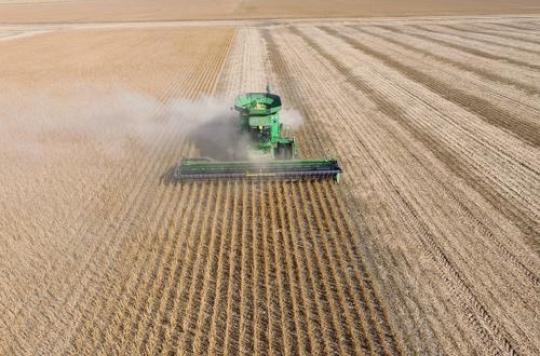A long follow-up epidemiological study of farmers and herbicide applicators in the United States shows unexpected results on the risks associated with glyphosate exposure

While the European Union must decide soon on the fate of glyphosate, a new analysis of a prospective study carried out on more than 50,000 American farmers and spreaders using glyphosate does not show a link between exposure to this herbicide and a risk increase in cancers or non-Hodgkin’s lymphomas, contrary to previous studies.
An unknown risk of acute leukemia
The “Agricultural Health Study”, which was started in the 90s, on the other hand, shows an association between glyphosate and an increased risk of acute myeloid leukemia. Among farmers and spreaders who have been handling this product for more than 20 years, this risk would even be more than doubled and largely significant.
These results are published in a very well done study published in the Journal of the National Cancer Institute (JNCI) and run counter to other data published in large studies, animal data (at high concentration). The Monsanto Papers had even objectified the fact that Monsanto had worrying data.
Extended follow-up over more than 20 years
The Agricultural Health Study is a prospective epidemiological study that consists of following a well-individualized cohort of 57,310 farmers and applicators handling glyphosate and 32,347 spouses, in Iowa and North Carolina. It was launched in the USA in the early 1990s largely to explore the possible causes of the higher incidence of cancers (solid tumors and non-Hodgkin’s lymphoma) in this population when compared to the general population.
From an epidemiological point of view, designing a study to study the cancer risk factors associated with exposure to a product that has spread in nature and in many foods is extremely difficult and subject to numerous biases. , but this study is of very good methodological quality.
Atypical data
Among the 54,251 farmers and spreaders, 44,932 (82.8%) used glyphosate and 5,779 cases of new cancers were observed during this follow-up.
In the analyzes on the whole group followed, glyphosate is not significantly associated with an increase in the risk of cancer, whatever its location.
On the other hand, among the spreaders who were most exposed to glyphosate, we observed an increased risk of acute myeloid leukemia (AML) compared to other users (RR = 2.44, 95% CI = 0.94 to 6.32 ), although this association was not statistically significant (P = 0.11).
Finally, the risk of acute myeloid leukemia increases with the duration of exposure and becomes statistically significant beyond 20 years of exposure (RRTertile 3 = 2.04, 95% CI = 1.05 to 3.97; P = 0.04).
A now ubiquitous product
Glyphosate is the most widely used herbicide in the world. It is found in nearly 40% of commonly consumed foods, even if the doses found there are well below the maximum tolerated limits.
It is classified as a “probable carcinogen” by the International Agency for Research on Cancer, a body of the World Health Organization (WHO), with strong mechanistic evidence and significant associations for non-Hodgkin’s lymphoma in some epidemiological studies.
The European Food Safety Authority and the European Chemicals Agency have both concluded that the available scientific knowledge is not sufficient for such a classification. However, these bodies have been criticized for their proximity to the chemical industry.
Reassuring data in the short term
An earlier evaluation of the Agricultural Health Study, conducted over a decade of follow-up (follow-up to 2001), found no statistically significant association between glyphosate use and cancer risk, regardless of be it.
This 20-year follow-up study identifies a new risk associated with prolonged exposure to glyphosate (acute myeloid leukemia) but does not find an increased risk of solid tumors and non-Hodgkin’s lymphoma.
Glyphosate divides within the European Union. Recently, member states failed to agree on a five-year license extension for this controversial herbicide. A new vote should take place soon in Brussels. There is no doubt that this study will not contribute to the serenity of the debates.

.

















